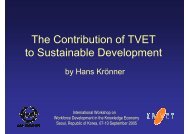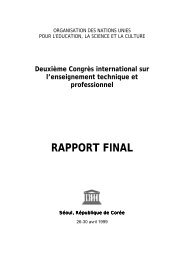Learning for Life, Work and the Future Initial ... - Unesco-Unevoc
Learning for Life, Work and the Future Initial ... - Unesco-Unevoc
Learning for Life, Work and the Future Initial ... - Unesco-Unevoc
You also want an ePaper? Increase the reach of your titles
YUMPU automatically turns print PDFs into web optimized ePapers that Google loves.
Page 14 Main <strong>Work</strong>ing Document <strong>Learning</strong> <strong>for</strong> <strong>Life</strong>, <strong>Work</strong> <strong>and</strong> <strong>the</strong> <strong>Future</strong><br />
Mauritius, which lead to much confusion. The<br />
problem of equivalence is difficult to sort out as different<br />
awarding bodies issue <strong>the</strong>se certificates. In<br />
addition many private training centres deliver <strong>the</strong>ir<br />
own certificates which add fur<strong>the</strong>r confusion.<br />
(Dubois, Mauritius)<br />
The Botswana National Training Authority Secretariat<br />
commissioned a study to chart <strong>the</strong> way <strong>for</strong>ward <strong>for</strong> <strong>the</strong><br />
establishment of <strong>the</strong> Botswana National Vocational<br />
Qualification Framework in 1998/99. The following is<br />
an extract from <strong>the</strong> study:<br />
The inventory of almost 700 vocational awards compiled<br />
by this study, <strong>and</strong> more especially <strong>the</strong> difficulty<br />
of trying to evaluate <strong>the</strong> real worth of <strong>the</strong>se consistently<br />
across a wide spectrum of purpose, duration,<br />
title, field <strong>and</strong> level, reveals <strong>the</strong> major problem of <strong>the</strong><br />
Botswana Vocational Education <strong>and</strong> Training system.<br />
Like many developing nations, it has inherited<br />
some systems <strong>and</strong> developed o<strong>the</strong>rs which, over time,<br />
have simply ceased to articulate with each o<strong>the</strong>r.<br />
This is a familiar story in many of <strong>the</strong> countries participating<br />
in this workshop, <strong>and</strong> some are already<br />
taking action to remedy <strong>the</strong> situation.<br />
Tanzania’s Competency-Based Education <strong>and</strong> Training<br />
(CBET), mentioned above, tackles <strong>the</strong> certification<br />
issue through a cross-curricular approach in which <strong>the</strong><br />
entire programme provision is modularised <strong>and</strong> creditbased,<br />
allowing learners to combine different modules.<br />
The Zimbabwe initiative is an innovative attempt to<br />
develop a flexible occupational st<strong>and</strong>ards framework<br />
which is dem<strong>and</strong>-driven, <strong>and</strong> which integrates<br />
efficiently with private <strong>and</strong> public sector education <strong>and</strong><br />
training programmes as well as with an emerging<br />
national qualifications framework.<br />
Consequently, in 1999, <strong>the</strong> Zimbabwe Occupational<br />
St<strong>and</strong>ards Service (ZOSS) was established as a twoyear<br />
pilot project to develop <strong>and</strong> recommend concepts,<br />
procedures, structures <strong>and</strong> systems <strong>for</strong> <strong>the</strong> achievement<br />
of <strong>the</strong> project objective, as outlined below:<br />
• Development of a multi-stakeholder <strong>and</strong> industrydriven<br />
organisation to develop <strong>and</strong> facilitate an<br />
effective partnership between Government, business<br />
<strong>and</strong> industry<br />
• Development of ZOSS as a national, regional <strong>and</strong><br />
international centre of excellence based on<br />
DACUM<br />
Though <strong>the</strong> project is co-sponsored by Zimbabwe<br />
Development Fund (ZIMDEF) <strong>and</strong> GTZ, it has <strong>the</strong><br />
potential <strong>for</strong> multi-donor support because of its<br />
viability as a regional resource centre.<br />
One of <strong>the</strong> Botswana papers proposed <strong>the</strong> establishment<br />
of a Credit Accumulation <strong>and</strong> Transfer System<br />
(CATS). These systems apparently allow students<br />
mobility <strong>and</strong> access to fur<strong>the</strong>r <strong>and</strong> higher education<br />
through <strong>the</strong> accumulation of educational credits <strong>and</strong> <strong>the</strong><br />
application of <strong>the</strong>se towards a fur<strong>the</strong>r <strong>and</strong> higher<br />
education qualification. The underlining principles are<br />
accessibility, transferability, flexibility <strong>and</strong> cost<br />
efficiency. It is argued that this model could initially<br />
be developed nationally, <strong>and</strong> later throughout <strong>the</strong><br />
SADC region.<br />
Many countries <strong>the</strong> world over, including South Africa<br />
(see box), have in place a National Qualification<br />
Framework (NQF). As one of <strong>the</strong> papers pointed out,<br />
<strong>the</strong> Second International Congress on Vocational<br />
Education <strong>and</strong> Training held in <strong>the</strong> Republic of Korea<br />
in 1999 considered a NQF to be important, <strong>and</strong> made<br />
recommendations accordingly.<br />
Lastly, <strong>the</strong> following extract from Mauritius may point<br />
<strong>the</strong> way <strong>for</strong>ward:<br />
It is strongly felt that <strong>the</strong> experience of countries that<br />
have made tremendous progress in setting up <strong>the</strong>ir<br />
national Qualification Framework should be sought.<br />
This subregional workshop could be an important<br />
<strong>for</strong>um <strong>for</strong> exchange of views <strong>and</strong> experiences. Eventually<br />
a regional qualification framework could be<br />
contemplated <strong>for</strong> <strong>the</strong> SADC countries.<br />
(Dubois, Mauritius)<br />
The National Qualification Framework<br />
The National Qualification Framework (NQF) is based on a<br />
system of credits <strong>for</strong> learning outcomes achieved. A<br />
learning outcome is essentially a capability developed in <strong>the</strong><br />
learner reflecting an integration of knowledge <strong>and</strong> skill<br />
which can be understood, applied <strong>and</strong> transferred to different<br />
contexts. The achievement of a qualification in such a<br />
system is not dependent on attendance at particular courses,<br />
but by a learner accumulating credit on an agreed cluster of<br />
learning outcomes defined by full-time, part-time or distance<br />
learning, by work-based learning or by a combination toge<strong>the</strong>r<br />
with <strong>the</strong> assessment of prior learning.<br />
The NQF is designed to:<br />
• Introduce a fair assessment system, which measures<br />
achievements against clearly stated national st<strong>and</strong>ards;<br />
• Establish a dynamic <strong>and</strong> flexible system able to adapt<br />
quickly to new developments in <strong>the</strong> labour market,<br />
workplace, education <strong>and</strong> training;<br />
• Encourage more people to participate in fur<strong>the</strong>r<br />
education <strong>and</strong> training;<br />
• Develop learning which is relevant <strong>and</strong> responsive to <strong>the</strong><br />
needs of <strong>the</strong> individual, <strong>the</strong> economy <strong>and</strong> society;<br />
• Promote access to learning;<br />
• Provide a variety of routes to qualifications, <strong>and</strong><br />
• Provide national quality assurance.<br />
(Samuels, South Africa)<br />
7 Unemployment<br />
Unemployment of young school-leavers is especially<br />
high <strong>and</strong> is a source of great concern to every Government<br />
in <strong>the</strong> region, <strong>and</strong> considered by many to be a<br />
‘time-bomb’’. This statement appeared in one of <strong>the</strong><br />
papers sent to participants to a Seminar on Education<br />
<strong>and</strong> Training <strong>for</strong> Employment Creation in <strong>the</strong> SADC<br />
countries, held in Zimbabwe during April in 1989.





